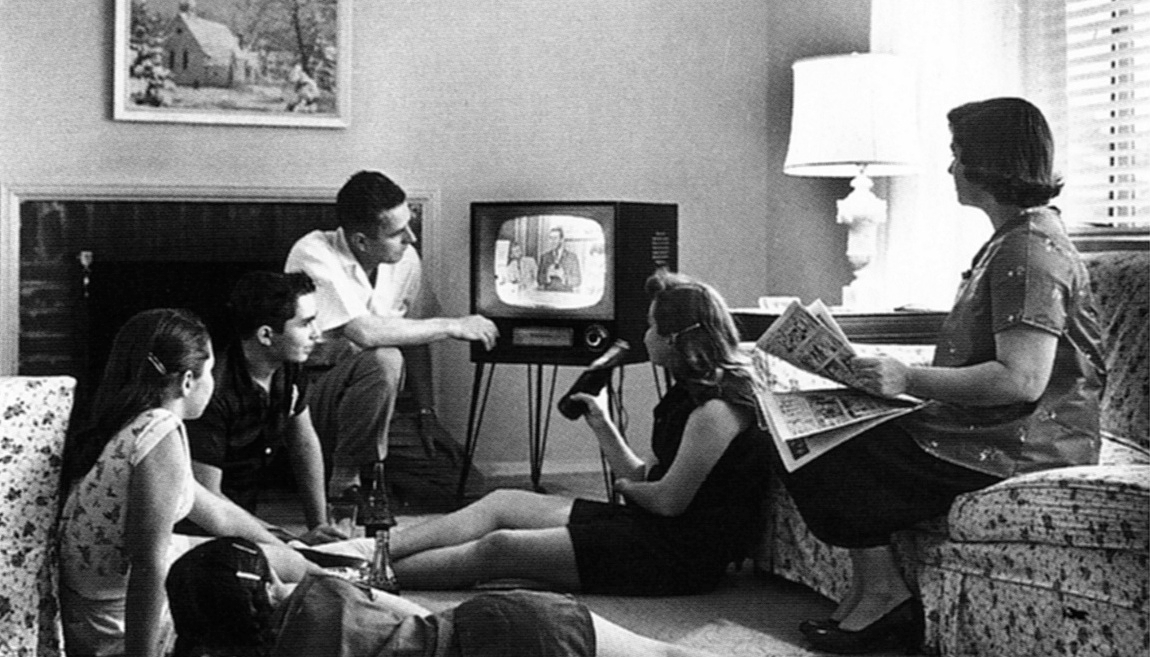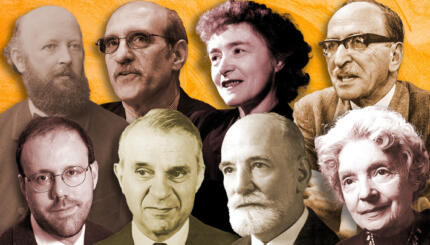In America, television became commercially available in the late 1930s, and widely accessible in American homes in the 1940s and 1950s. From the start, Jews played a prominent role in the industry. In addition to producing television shows and starring on them, at certain points more than others, Jewish characters appeared in the “small screen” as well.
The variety show was one of the first venues for live entertainment on television, and many contributors to these shows in the 1950s and ’60s were Jewish comedians. Hosts like Milton Berle and Sid Caesar and writers like Woody Allen, Mel Brooks, and Neil Simon brought Jewish humor into the mainstream, combining traditional Yiddishisms with physical comedy.
Early Television
One of the most popular sitcoms of the 1950s was The Goldbergs, a show about Molly Goldberg, a Jewish woman from the Bronx. Though they moved to WASP suburbia over the course of the show, the Goldberg family did not hide their Judaism, and the show was influenced by the star, producer, and writer, Gertrude Berg, and her Jewish background. She spoke with a slight Eastern European accent, and her language was often inflected with Yiddish (“Give me a swallow, the glass”).
But in the mid-1950s, The Goldbergs was taken off the air. In the coming years, a few shows had Jewish characters, but none covered explicitly Jewish topics. Executives on The Dick Van Dyke Show, which was created and written by Jews, urged the show’s writers to make its New York Jewish main character less “ethnic.”
With your help, My Jewish Learning can provide endless opportunities for learning, connection and discovery.
Family Ties
In the 1970s, as particularism became less taboo, series about African-American families gained popularity, and other television shows explored Jewish topics more explicitly. One of the most popular Jewish characters on television was Rhoda Morgenstern from The Mary Tyler Moore Show, and its eventual spin off, Rhoda. Played by Valerie Harper, Rhoda made her Judaism explicit, but also projected many negative stereotypes–always worrying about her weight, and being neurotic about men. The show also famously covered her marriage to a non-Jewish man.
Anti-Semitism was also depicted on sitcoms during the 1970s and 1980s, most famously with the hit show All in the Family. The show’s main character, Archie Bunker, was known for his closed-mindedness and racial prejudices. But Bunker had a good heart, highlighted by his relationship with Stephanie, a young Jewish girl he and his wife raise after Stephanie’s mother is killed.
Much Ado about Nothing
In the 1980s, Jewish characters were few and far between, and the decade did not yield very many memorable television shows with Jewish themes. All that changed in the 1990s, thanks to the observational comedy of Jerry Seinfeld. Seinfeld revolutionized the way Jews were portrayed on television, unabashedly focusing entire episodes on Jewish themes, from attending a bris, to dealing with crazy Jewish parents.
A number of other shows followed Seinfeld‘s lead, featuring openly Jewish characters and themes, and some episodes dealt with controversial Jewish subjects. Whether it was the stereotypical portrayal of the materialistic Jewish Long Island girl in The Nanny, intermarriage on Dharma & Greg, or negative stereotypes about Jewish men on Friends, the portrayal of Jews on television did not sit well with everyone in the Jewish community.
If the 1990s saw an upsurge of Jewish characters on television, the 2000s realized the normalization of Judaism on television. More and more shows featured Jewish characters, but shows made less of a big deal about their Judaism. Characters like Larry David on Curb Your Enthusiasm, Sarah Silverman on The Sarah Silverman Program, and Ari Gold on Entourage took the reigns from Seinfeld‘s Jerry, Elaine and George.
As Jewish characters and themes proliferated, Jewishness on television became less of a novelty. This trend is most apparent on The Daily Show with Jon Stewart, the satirical nightly news show where Stewart ranted about the day’s events. Stewart is an unashamed secular Jew, and on numerous occasions during the week he made references to Judaism or Yiddishisms, bringing formerly Jewish inside jokes into mainstream culture.



